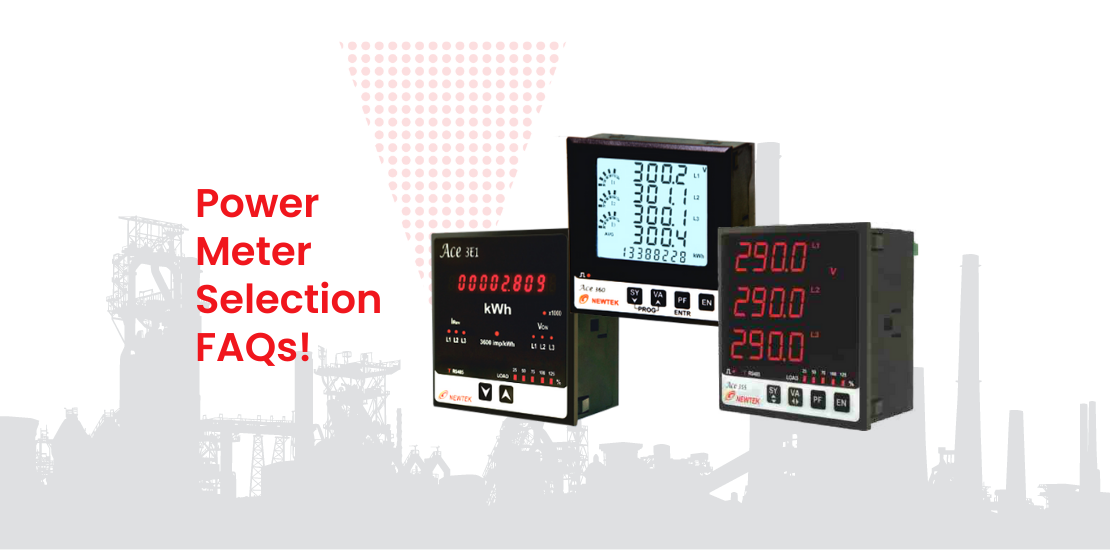- June 29, 2021
- Posted by: Dyaneshwar Nirmale
- Category: Digital Meters

Multifunction meters are a critical piece of electrical equipment. From energy audits to sub metering for buildings, they are used in areas where accurate measurement of energy is essential. Precise readings from the meter then aid industrial facilities in optimizing their power use, and saving power costs.
When it comes to buying a meter, the consumer is faced with certain key question. These questions go beyond the cost or technical specifications of the meter. What meter should you choose for temporary tasks such as energy audits?
The consumer must be absolutely clear about what kind of data they want the meter to yield, and how the data is to be used. In this blog, we address such frequently asked questions related to how application nature impacts the choice of multifunction meters.
What impact does the duration of the project have on meter choice?
The duration and nature of application determines whether a compact portable meter is enough or a heavier meter is needed for the job. For instance, if you are undertaking a load study which will be completed within a month, Portable meters can be moved and connected to multiple panels. After the project is completed, they can be shifted to a new location for use in other such temporary tasks like measurement and verification undertakings.
Inversely, if you are installing a meter for permanent sub metering of your facility, a more durable meter is required. Such meters are wired directly into the panel. While it limits portability, these meters provide reliable service for long periods without surrendering to elements of nature that could damage it over time.
What is the quality of accuracy you require?
Various multifunction meters provide accuracy measures that differ is lightly but might make significant difference to the final measurement results. The portable meters offer an accuracy of up to 0.2% whereas bigger meters offer an accuracy of 0.5% or higher. Meters that provide accuracy better than 1% are the best suited for temporary tasks such as energy audits or load studies. Key accuracy standards applied to these meters include ANSI C12.20-2010 qualified Class 0.2 and ANSI C12.20-2010 Class 0.5
What way works the best for you to collect data from the meter?
It seems a trivial question, but fetching the data collected by the meter does take some amount of precious time. In case of some portable meters, the meters have an on-board memory. The user must connect a USB cable to the meter and download data in their laptop. Some meters allow the use of WiFi to download the data from their memory.
The non-portable meters have a different data collection mechanism. Instead of having an internal memory, these meters send the data to a separate data logger or to the automation and control system of the building. The data is sent or retrieved using protocols such as MS/TP, BAC net IP, Modbus TCP or RS-485.
All Newtek multifunction meters use the MODBUS (RS – 485) protocol to send data to loggers where it can be accessed at your convenience
The data can be accessed through the separate logger. This system also enables data access and monitoring on a remote dashboard display.
What kind of loads are you measuring?
Depending on whether you want to measure a single phase or a three phase load, you could use mix of multifunction meters and CTs to achieve desired measurements. Portable MFMs allow you to measure either a single phase or a three phase load. On the other hand, the more powerful Newtek meter allows running up to 24 single phase loads, and 8 three-phase loads. Additionally, for different requirements, you can use a combination of various current transformers and meters to measure single and three-phase load simultaneously.
Could you use a smart logger instead of a multifunction meter?
Smart loggers are built to measure the runtime information of a load. They can only be used in certain circumstances. Loggers typically measure the time for which lights or motors remian on and when they are turned off. Loggers by themselves cannot offer any information on how much energy these devices consumed. Deriving that needs some post-processing work. Consumers must invest in special software that offer such post-processing capabilities.
The multifunction meters on the other hand tell you how much energy you have consumed rather than how long your machines or lights are running.
Need more help in selecting MFM?
Choosing a multifunction requires consideration of several factors, technical and non-technical. The meter has a direct impact on your costs as well as operations. To learn more about technical considerations in meter selection, read our blog here.
Newtek Electrical has been working for 10+ years to provide efficient, durable and cost-effective power measurement solutions to Indian businesses. In case you need additional help in choosing a multifunction meter, call us at Newtek Electricals on +91 93728 62651 / 93728 62635. Or, write to us at sales@newtekelectricals.com, and we will reply to your query within 24 hours!
